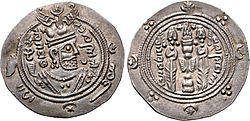Farrukhan the Great
| Farrukhan the Great | |
|---|---|
| Ispahbadh of Tabaristan, Padashwargarshah (Shah of Patashwargar), Gīlgīlan | |

Silver dirham issued by Farrukhan the Great.
|
|
| Reign | 712-728 |
| Predecessor | Dabuya |
| Successor | Dadhburzmihr |
| Born | Unknown Tabaristan |
| Died | 728 Sari |
| House | Dabuyid dynasty |
| Father | Dabuya |
| Religion | Zoroastrianism |
Farrukhan the Great (in Persian: فرخان بزرگ, Farrukhan-e Bozorg; fl. 712–728) was the independent ruler (ispahbadh) of Tabaristan in the early 8th century, until his death in 728. He is the first actually attested (through his coinage) member of the Dabuyid dynasty, which is traditionally held to have ruled Tabaristan since the time of the Muslim conquest of Persia. He maintained his independence against the attacks of the Umayyad Caliphate, and was succeeded by his eldest son, Dadhburzmihr.
Farrukhan had 3 sons, whom were named Saruyih, Farrukhan the Little and Dadhburzmihr.
During his early rule, he reconstructed the city of Zadracarta and made it his capital, and because his son's name was "Saruyih", he called it by this name, which later became known as Sari.
...
Wikipedia
